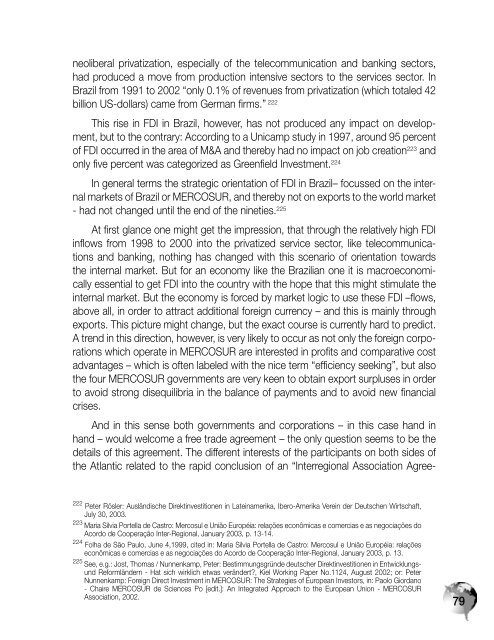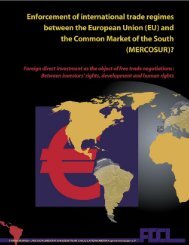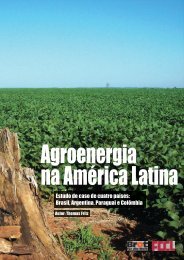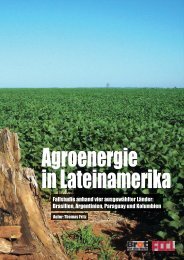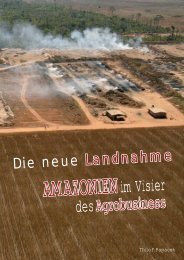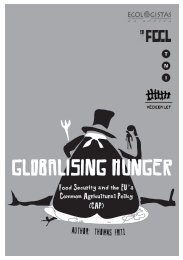(EU) and the Common Market of the South (MERCOSUR)? - FDCL
(EU) and the Common Market of the South (MERCOSUR)? - FDCL
(EU) and the Common Market of the South (MERCOSUR)? - FDCL
Create successful ePaper yourself
Turn your PDF publications into a flip-book with our unique Google optimized e-Paper software.
neoliberal privatization, especially <strong>of</strong> <strong>the</strong> telecommunication <strong>and</strong> banking sectors,<br />
had produced a move from production intensive sectors to <strong>the</strong> services sector. In<br />
Brazil from 1991 to 2002 “only 0.1% <strong>of</strong> revenues from privatization (which totaled 42<br />
billion US-dollars) came from German firms.” 222<br />
This rise in FDI in Brazil, however, has not produced any impact on development,<br />
but to <strong>the</strong> contrary: According to a Unicamp study in 1997, around 95 percent<br />
<strong>of</strong> FDI occurred in <strong>the</strong> area <strong>of</strong> M&A <strong>and</strong> <strong>the</strong>reby had no impact on job creation 223 <strong>and</strong><br />
only five percent was categorized as Greenfield Investment. 224<br />
In general terms <strong>the</strong> strategic orientation <strong>of</strong> FDI in Brazil– focussed on <strong>the</strong> internal<br />
markets <strong>of</strong> Brazil or <strong>MERCOSUR</strong>, <strong>and</strong> <strong>the</strong>reby not on exports to <strong>the</strong> world market<br />
- had not changed until <strong>the</strong> end <strong>of</strong> <strong>the</strong> nineties. 225<br />
At first glance one might get <strong>the</strong> impression, that through <strong>the</strong> relatively high FDI<br />
inflows from 1998 to 2000 into <strong>the</strong> privatized service sector, like telecommunications<br />
<strong>and</strong> banking, nothing has changed with this scenario <strong>of</strong> orientation towards<br />
<strong>the</strong> internal market. But for an economy like <strong>the</strong> Brazilian one it is macroeconomically<br />
essential to get FDI into <strong>the</strong> country with <strong>the</strong> hope that this might stimulate <strong>the</strong><br />
internal market. But <strong>the</strong> economy is forced by market logic to use <strong>the</strong>se FDI –flows,<br />
above all, in order to attract additional foreign currency – <strong>and</strong> this is mainly through<br />
exports. This picture might change, but <strong>the</strong> exact course is currently hard to predict.<br />
A trend in this direction, however, is very likely to occur as not only <strong>the</strong> foreign corporations<br />
which operate in <strong>MERCOSUR</strong> are interested in pr<strong>of</strong>its <strong>and</strong> comparative cost<br />
advantages – which is <strong>of</strong>ten labeled with <strong>the</strong> nice term “efficiency seeking”, but also<br />
<strong>the</strong> four <strong>MERCOSUR</strong> governments are very keen to obtain export surpluses in order<br />
to avoid strong disequilibria in <strong>the</strong> balance <strong>of</strong> payments <strong>and</strong> to avoid new financial<br />
crises.<br />
And in this sense both governments <strong>and</strong> corporations – in this case h<strong>and</strong> in<br />
h<strong>and</strong> – would welcome a free trade agreement – <strong>the</strong> only question seems to be <strong>the</strong><br />
details <strong>of</strong> this agreement. The different interests <strong>of</strong> <strong>the</strong> participants on both sides <strong>of</strong><br />
<strong>the</strong> Atlantic related to <strong>the</strong> rapid conclusion <strong>of</strong> an “Interregional Association Agree-<br />
222<br />
Peter Rösler: Ausländische Direktinvestitionen in Lateinamerika, Ibero-Amerika Verein der Deutschen Wirtschaft,<br />
July 30, 2003.<br />
223<br />
Maria Silvia Portella de Castro: Mercosul e União Européia: relações econômicas e comercias e as negociações do<br />
Acordo de Cooperação Inter-Regional, January 2003, p. 13-14.<br />
224<br />
Folha de São Paulo, June 4,1999, cited in: Maria Silvia Portella de Castro: Mercosul e União Européia: relações<br />
econômicas e comercias e as negociações do Acordo de Cooperação Inter-Regional, January 2003, p. 13.<br />
225<br />
See, e.g.: Jost, Thomas / Nunnenkamp, Peter: Bestimmungsgründe deutscher Direktinvestitionen in Entwicklungsund<br />
Reformländern - Hat sich wirklich etwas verändert?, Kiel Working Paper No.1124, August 2002; or: Peter<br />
Nunnenkamp: Foreign Direct Investment in <strong>MERCOSUR</strong>: The Strategies <strong>of</strong> European Investors, in: Paolo Giordano<br />
- Chaire <strong>MERCOSUR</strong> de Sciences Po [edit.]: An Integrated Approach to <strong>the</strong> European Union - <strong>MERCOSUR</strong><br />
Association, 2002.<br />
79


